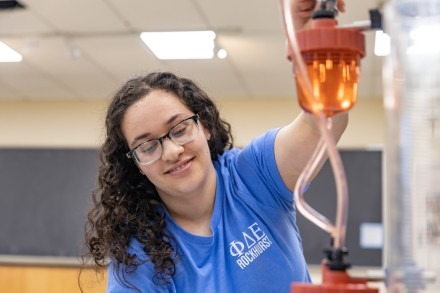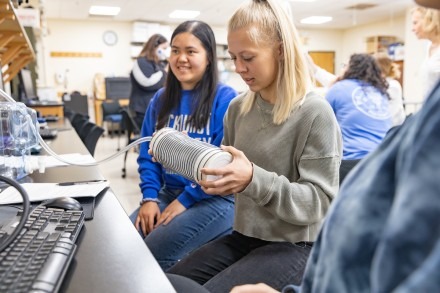The Biophysics/Physics of Medicine major track at Rockhurst University is interdisciplinary and designed for students who wish to attend clinical graduate school programs in medicine or health care.


Program Overview
Biophysics/Physics of Medicine (POM) students experience a unique, hands-on curriculum that focuses on a deep conceptual understanding of physics as it applies to other sciences, medicine and health care. Our medical physics graduates leave Rockhurst with strong communication and critical thinking skills that enable them to integrate their scientific understanding with their desired career path.
In this major you'll learn the role of physics in the biomechanics of the human body, respiratory and cardiovascular systems, electrical system and functioning of the eyes and ears. You'll also gain an understanding of the physics that guides medical and nuclear imaging, therapy and endoscopic surgery.
Maximize your potential for acceptance into competitive graduate programs in medicine, physical therapy, biomechanics or other health care programs by setting yourself apart with this degree.
Many students who have gone on to graduate schools in medicine and health care have remarked how beneficial a strong foundation in Physics of Medicine has been to their admission and success in competitive graduate programs. (See Alumni Quotes below)
The physics of medicine track is part of the Interdisciplinary Studies at RU. A Physics of Medicine minor is also available.
Rockhurst University POM Program Accomplishments
- Graduates attend competitive graduate programs in medical school, physical therapy, master's in prosthetics, optometry
- Three National Science Foundation Grant Awards for POM curriculum development
- Three national awards from the American Academy of Medical Colleges for outstanding pre-health physics curriculum
- Ranked first nationally in awarding a second degree in physics to women
- American Physical Society Award for Improving Undergraduate Physics Education
- Physics Faculty Teacher Excellence Awards
- Over the past decade-plus, the physics department at Rockhurst University has made a concentrated effort toward transformation and growth through the design of courses relevant to its students’ career interests in medicine and health care. Using an inquiry-based, active learning pedagogy with research-based curriculum, the department has seen a dramatic increase in the number and diversity of its physics students. Read more from aps.org (2019)
Learning Outcomes
Students will demonstrate...
- their conceptual understanding of a wide range of applications of physics to the human body and healthcare devices.
- the ability to analyze a wide range of situations using their understanding of selected topics from physics, biology, physiology, and chemistry.
- their ability to research, design and create a working model of a system in the body relating physics principles to medicine and healthcare.
- proficiency in oral and written scientific communication and will demonstrate that they can think critically and work independently.
Program Outcomes
Students with a Biophysics/Physics of Medicine major graduate with excellent critical thinking, reasoning and communication skills. With appropriate prerequisites and electives, students have successfully entered the following programs upon graduation:
- Medical school, physical therapy school, optometry school, Master of Science in prosthetics and orthotics, veterinary school, dental school
- Physician’s assistant Master of Science
- Graduate programs in biomedical sciences, bio-imaging, rehabilitation science
- Graduate school in business or health care administration
- Medical technology sales
Alumni Quotes
About the physics of medicine program, one student who went on to osteopathic medical school said the following:
Osteopathic Medical School Student:
"The physiology that is taught at KCU is very similar to the information that we studied in Physics of the Body. I feel slightly ahead of my classmates in this section. This is partially due to the material similarities but also due to the fact that we were really taught to think and rationalize the physics of the body. I would encourage any students thinking about a graduate degree program in health care to take Physics of Medicine. It has helped so immensely." — Madison Roberts, RU '17, Kansas City University DO Candidate '21
Additional Medical School Students:
“… you really taught us to think and rationalize the physics of the body.” I would encourage any students thinking about a graduate program in health care to take POM. It has helped so immensely.”
“I think you have a groundbreaking program in physics of medicine and I would encourage students to take it if they are interested in health careers.”
Physical Therapy Student:
“I am very proud of the knowledge I attained in my POM major and am really happy with how much it is helping me in grad school. I hope you share this with your students and prospective PT candidates. They need to know how helpful the POM major is in preparing for PT school.”
Physician
Physician Assistant
Medical Technologist
Surgeon
Radiation Therapist
Medical Physicist
Postdoctoral Fellow
Clinical Laboratory Scientist
Course Map
Degree and class descriptions and requirements can be found by clicking on the course catalog listings below:
Popular Courses
An introduction to physics for students majoring in science or interested in medical or therapy-related pre-professional programs. This course will emphasize the scientific method and physical reasoning, particularly a conceptual understanding and the applicability of physics to the students’ major area of study and career interests. Course content will cover concepts of classical mechanics: conservation of energy and momentum, forces, motion and waves.
This course focuses on an introduction to areas of modern physics required for an understanding of contemporary medical diagnostic and treatment procedures. Topics include a focus on the physics underlying modern medical diagnostic and therapeutic technology: the EM Spectrum, Radiology (X-Ray, CT), Nuclear Medicine (Gamma Camera, SPECT, PET), MRI, hybrid instrumentation and radiation treatment.
Investigates the biological bases of behavior. Unit One focuses on understanding basic neural structures and processes as well as basic brain anatomy and function. Unit Two explores the neurological underpinnings of basic human functions, such as language, emotion, memory, and sexual differentiation. Unit Three examines a variety of brain dysfunctions, including disorders of perception, memory, movement, emotion, and thought.
Independent or collaborative student research capstone on coursework from Biomedical Physics: Physics of Medicine, Biomedical Physics: Biomedical Engineering or Physics major tracks. Students will work with faculty to choose a research topic to investigate and prepare for oral public presentation to demonstrate mastery of major area of study.
Degree Info
- One-year Physics of the Body research project
- Field trips to a medical imaging and nuclear medicine facility
- Opportunity to join Sigma Pi Sigma, the national physics honor society
- Service Opportunities: “Wacky Science Night” at the local children’s hospital
- Research in Physics of Medicine capstone with an opportunity to present work nationally
- Students can join the Society of Physics Students on campus
- Learn through an integrated, interdisciplinary, hands-on curriculum funded by the National Science Foundation that will give you a significant advantage for your future health career.
POM Curriculum Notes
Physics of Medicine, B.S.
The Physics of Medicine curriculum was developed under a National Science Foundation grant award. The active learning, hands-on curricular modules developed under the grant (Physics of the Respiratory System and Fiber Optics in Medicine) have won national awards from the American Association of Medical Colleges (AAMC). In large part due to the Physics of Medicine track, Rockhurst ranks first in the nation in awarding a second degree in physics to females and 7th nationally in awarding a second degree in physics to all genders.
As a physics of medicine student, you will take everything from introductory physics courses to upper-division courses such as Physics of the Body, Physics of Medical Imaging, Optics and Medical Imaging.
In addition to 16 hours of core physics of medicine courses, you will choose nine hours of interdisciplinary coursework from a list of additional courses such as Kinesiology Concepts, Advanced Human Anatomy, Biochemistry, Behavioral Neuroscience, Medical Ethics, Developmental Psychology and Perspectives in Global Health.
Physics of Medicine Minor
Rockhurst offers the physics of medicine minor that you can coordinate with your chosen major. For this minor, you will take four physics of medicine courses.
For more information on Rockhurst's POM major or minor, please contact Nancy Donaldson, Ph.D.
Find Your Program
Choose topic to quickly find specific program details
